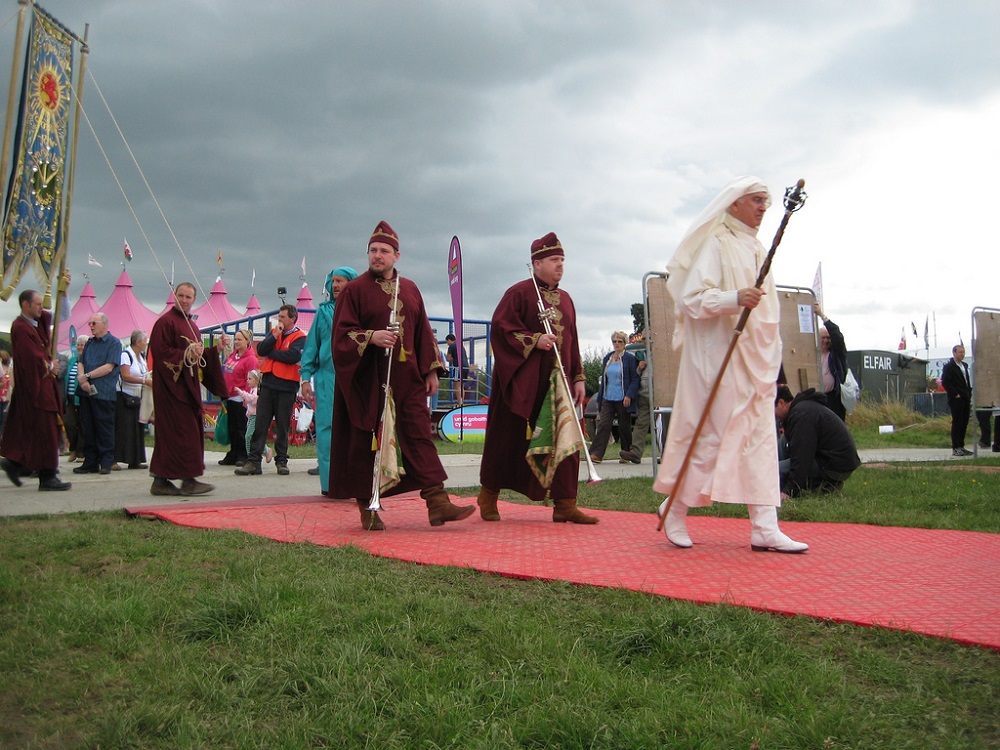The deep history of the National Eisteddfod

Christine James, Emeritus Professor of Welsh, Swansea University
The National Eisteddfod opens its gates in Pontypridd, a few miles north of Cardiff, from August 3 to 10 in 2024. Attracting up to 170,000 visitors, it is probably the largest travelling festival of its kind in Europe.
The Eisteddfod is a celebration of the language, culture and heritage of Wales. More than 1,000 events and activities for all ages across all artistic genres will take place, from modern to traditional music, poetry and literature, art, dance and comedy. There are also activities for children and even a science and technology village.
Taking part in almost 200 competitive events will be 5,000 groups and individuals. They include classical singing and performing to brass bands, and much-loved hymn singing for people over 60, as well as a wide range of choral competitions. These take place alongside performances by contemporary bands, singers, rappers and DJs.
But while the Eisteddfod aims to represent the diversity and traditions of modern Wales, its roots go deep into the country’s history. The first recorded Eisteddfod took place in the court of nobleman Lord Rhys in Cardigan castle, west Wales, in 1176. And inspiration for the modern event came from even further back.
Although held at least occasionally in the intervening period, Welsh societies based in London revived the Eisteddfod tradition at the end of the 18th century. The antiquarian and poet, Edward Williams, better known by his bardic name Iolo Morganwg, invented the Gorsedd of the Bards ceremonies in 1792. He claimed that these were based on Britain’s ancient druidic rituals, and the first Gorsedd was held on Primrose Hill, north London, during the summer solstice.
After that time, an Eisteddfod was held regularly in different locations across Wales. But it wasn’t until 1861 that the first modern day National Eisteddfod was held in Aberdare. By then, the Gorsedd had become intrinsically linked with the festival.
Since that time, the Eisteddfod has alternated between north and south Wales, and has only been postponed three times in more than 160 years – in 1914 because of the first world war, and in 2020 and 2021 because of COVID-19.
The Maes and Y Pafiliwn
The Eisteddfod’s site is known as the Maes and, within it, Y Pafiliwn (the pavilion) is home to the Eisteddfod’s renowned competitions programme. These are what set the Eisteddfod apart from other events and activities in Wales, and are the main reason many visitors attend the festival.
Hundreds of entries for various competitions, including literature and art, are submitted and adjudicated anonymously, with the winners’ names unveiled at ceremonies during the festival.
Until recently, competitors’ names were kept in sealed envelopes, with only the winner’s envelope opened by organisers. All other envelopes were stored, unopened, in the festival’s archive at the National Library of Wales in Aberystwyth. Since the pandemic, though, entries have been submitted online, with entrants’ names “sealed” in confidential digital envelopes.

The best writers and poets in Wales are honoured specifically by the Gorsedd, which also honours individuals who have contributed to their communities or to Wales every year. The colourful ceremonies are held in the open air on the Maes amid a stone circle and inside Y Pafiliwn.
One of the most notable festivals of the modern period was the Birkenhead Eisteddfod of 1917, which was held there because of the first world war. The archdruid announced that the winner of Y Gadair (the chair), awarded for strict metre poetry, was Ellis Humphrey Evans, better known by his bardic name, Hedd Wyn.
Unbeknown to the judges, he had been killed in action in France a few weeks prior to the Eisteddfod. A black cloth was draped over the chair. It is still known as Eisteddfod y Gadair Ddu (the Eisteddfod of the Black Chair) more than a century later.
Winning both Y Gadair or Y Goron (the crown), which is awarded for free-metre poetry, is an impressive feat. But winning both in the same year is a rare accomplishment. Until 2023, only three poets had achieved the near-mythical “double double”, winning both the chair and crown in the same week, twice.
T.H. Parry-Williams, Alan Llwyd and Donald Evans sealed their place in history with their accomplishments. At last year’s festival, Alan Llwyd once again won the chair, becoming the first modern-day poet to win one of the main prizes three times.
This year’s Eisteddfod brings the festival to the heart of the south Wales valleys. It is the pinnacle of a two year community project across the county of Rhondda Cynon Taf, with numerous fundraising events held to welcome the festival to the area for the first time since 1956.
This article was first published on The Conversation
![]()
Support our Nation today
For the price of a cup of coffee a month you can help us create an independent, not-for-profit, national news service for the people of Wales, by the people of Wales.






Excellent informative article. The last National Eisteddfod in Pontypridd was in 1893 so long overdue considering the location. No adjacent fields packed with thousands of cars but an opportunity for us all to show we can use public transport, even if it’s just the last few miles.
In know fewer are following the rapid demise of Wales Online, but it’s shocking that they today don’t even cover the largest cultural event in Europe, opening in our country. Seems to be just kids click-baiting stories sent in by wanabee influencers.
Couldn’t agree more.
Noticed the other day that Wales Online was referencing a trip to ‘the Brecon Beacons National Park’, too.
Where’s that?